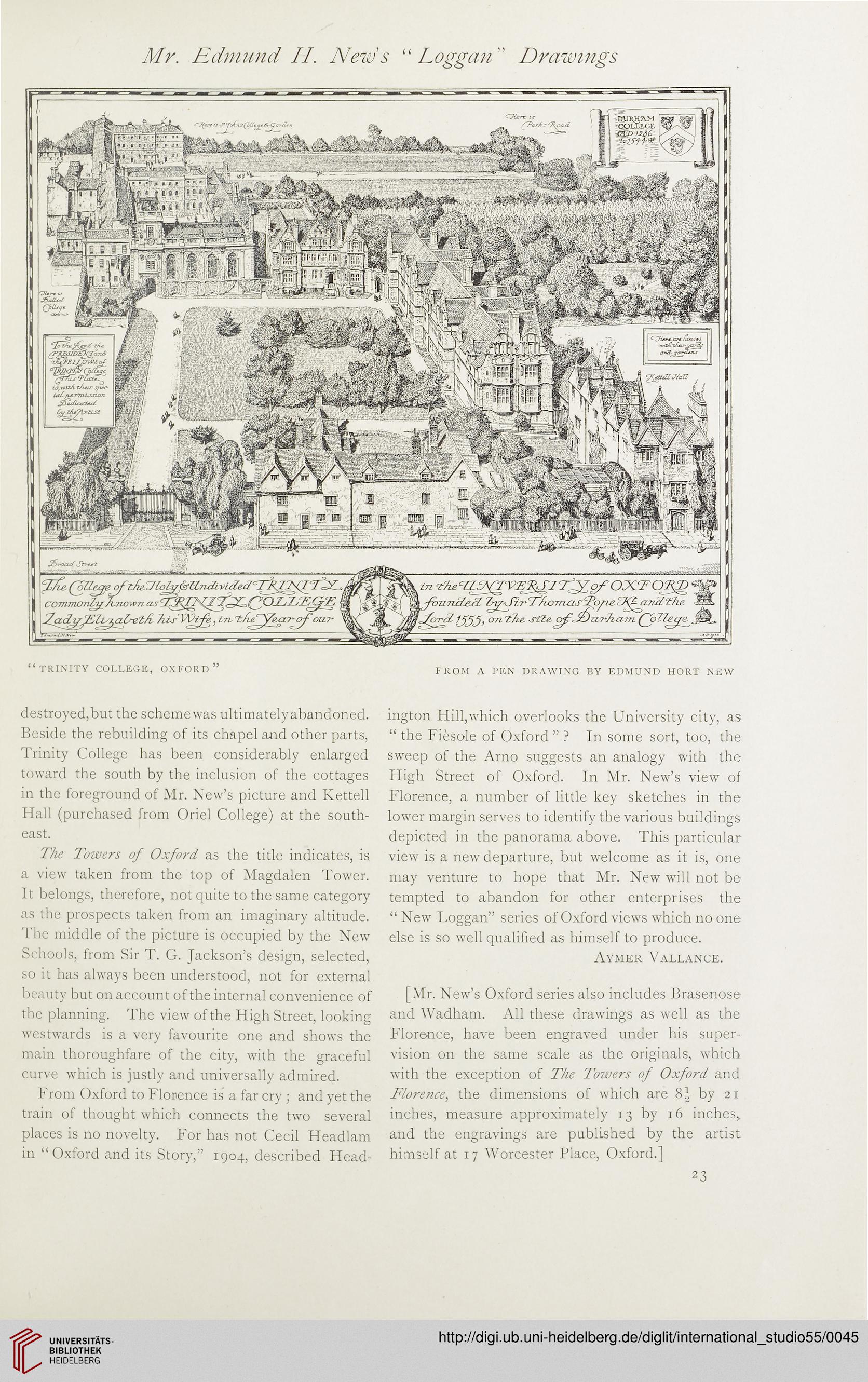Mr. Edmund Id. News “ Loggan" Drawings
“trinity college, oxford
FROM A PEN DRAWING BY EDMUND HORT NEW
destroyed,but the schemewas ultimatelyabandoned.
Beside the rebuilding of its chapel and other parts,
Trinity College has been considerably enlarged
toward the south by the inclusion of the cottages
in the foreground of Mr. New’s picture and Kettell
Hall (purchased from Oriel College) at the south-
east.
The Towers of Oxford as the title indicates, is
a view taken from the top of Magdalen Tower.
It belongs, therefore, not quite to the same category
as the prospects taken from an imaginary altitude.
The middle of the picture is occupied by the New
Schools, from Sir T. G. Jackson’s design, selected,
so it has always been understood, not for external
beauty but on account of the internal convenience of
the planning. The view of the High Street, looking
westwards is a very favourite one and shows the
main thoroughfare of the city, with the graceful
curve which is justly and universally admired.
F rom Oxford to Florence is a far cry ; and yet the
train of thought which connects the two several
places is no novelty. For has not Cecil Headlam
in “Oxford and its Story,” 1904, described Head-
ington Hill,which overlooks the University city, as
“the Fiesole of Oxford”? In some sort, too, the
sweep of the Arno suggests an analogy with the
High Street of Oxford. In Mr. New’s view of
Florence, a number of little key sketches in the
lower margin serves to identify the various buildings
depicted in the panorama above. This particular
view is a new departure, but welcome as it is, one
may venture to hope that Mr. New will not be
tempted to abandon for other enterprises the
“ New Loggan” series of Oxford views which no one
else is so well qualified as himself to produce.
Aymer Vallance.
[Mr. New’s Oxford series also includes Brasenose
and Wadham. All these drawings as well as the
Florence, have been engraved under his super-
vision on the same scale as the originals, which
with the exception of The Towers of Oxford and
Florence, the dimensions of which are 8 J by 21
inches, measure approximately 13 by 16 inches,,
and the engravings are published by the artist
himself at 17 Worcester Place, Oxford.]
23
“trinity college, oxford
FROM A PEN DRAWING BY EDMUND HORT NEW
destroyed,but the schemewas ultimatelyabandoned.
Beside the rebuilding of its chapel and other parts,
Trinity College has been considerably enlarged
toward the south by the inclusion of the cottages
in the foreground of Mr. New’s picture and Kettell
Hall (purchased from Oriel College) at the south-
east.
The Towers of Oxford as the title indicates, is
a view taken from the top of Magdalen Tower.
It belongs, therefore, not quite to the same category
as the prospects taken from an imaginary altitude.
The middle of the picture is occupied by the New
Schools, from Sir T. G. Jackson’s design, selected,
so it has always been understood, not for external
beauty but on account of the internal convenience of
the planning. The view of the High Street, looking
westwards is a very favourite one and shows the
main thoroughfare of the city, with the graceful
curve which is justly and universally admired.
F rom Oxford to Florence is a far cry ; and yet the
train of thought which connects the two several
places is no novelty. For has not Cecil Headlam
in “Oxford and its Story,” 1904, described Head-
ington Hill,which overlooks the University city, as
“the Fiesole of Oxford”? In some sort, too, the
sweep of the Arno suggests an analogy with the
High Street of Oxford. In Mr. New’s view of
Florence, a number of little key sketches in the
lower margin serves to identify the various buildings
depicted in the panorama above. This particular
view is a new departure, but welcome as it is, one
may venture to hope that Mr. New will not be
tempted to abandon for other enterprises the
“ New Loggan” series of Oxford views which no one
else is so well qualified as himself to produce.
Aymer Vallance.
[Mr. New’s Oxford series also includes Brasenose
and Wadham. All these drawings as well as the
Florence, have been engraved under his super-
vision on the same scale as the originals, which
with the exception of The Towers of Oxford and
Florence, the dimensions of which are 8 J by 21
inches, measure approximately 13 by 16 inches,,
and the engravings are published by the artist
himself at 17 Worcester Place, Oxford.]
23




